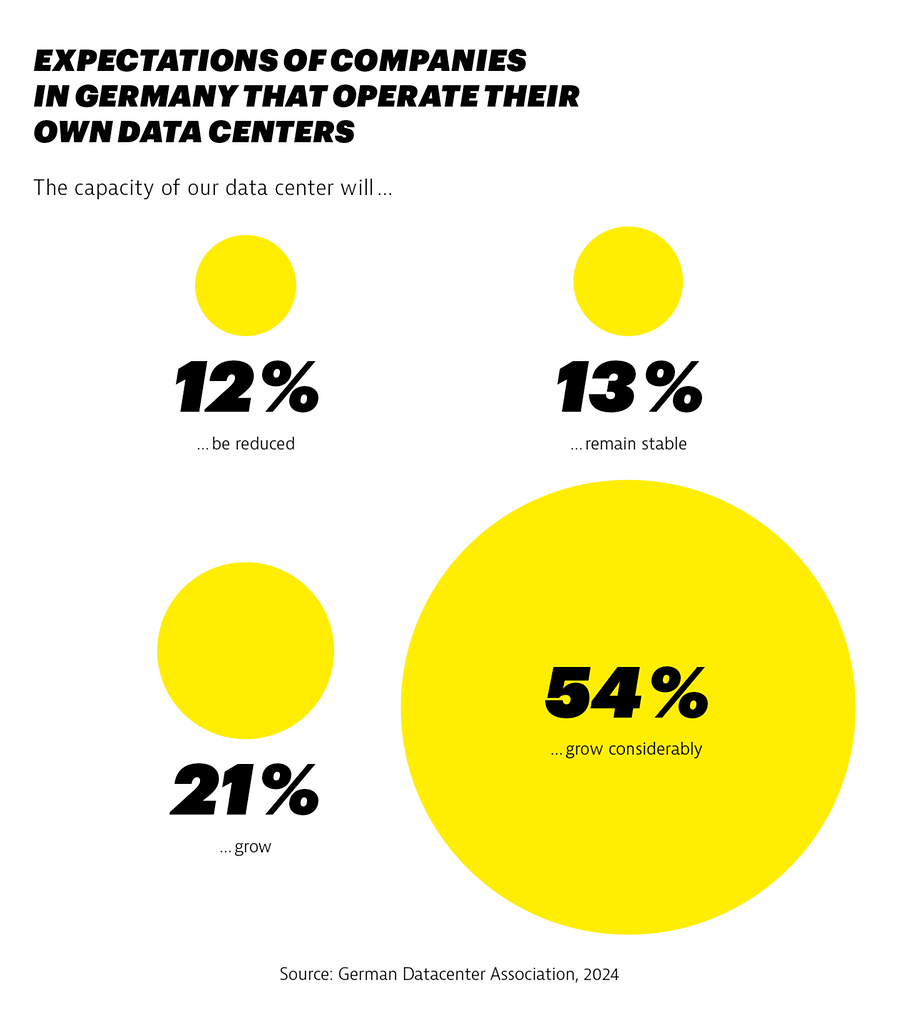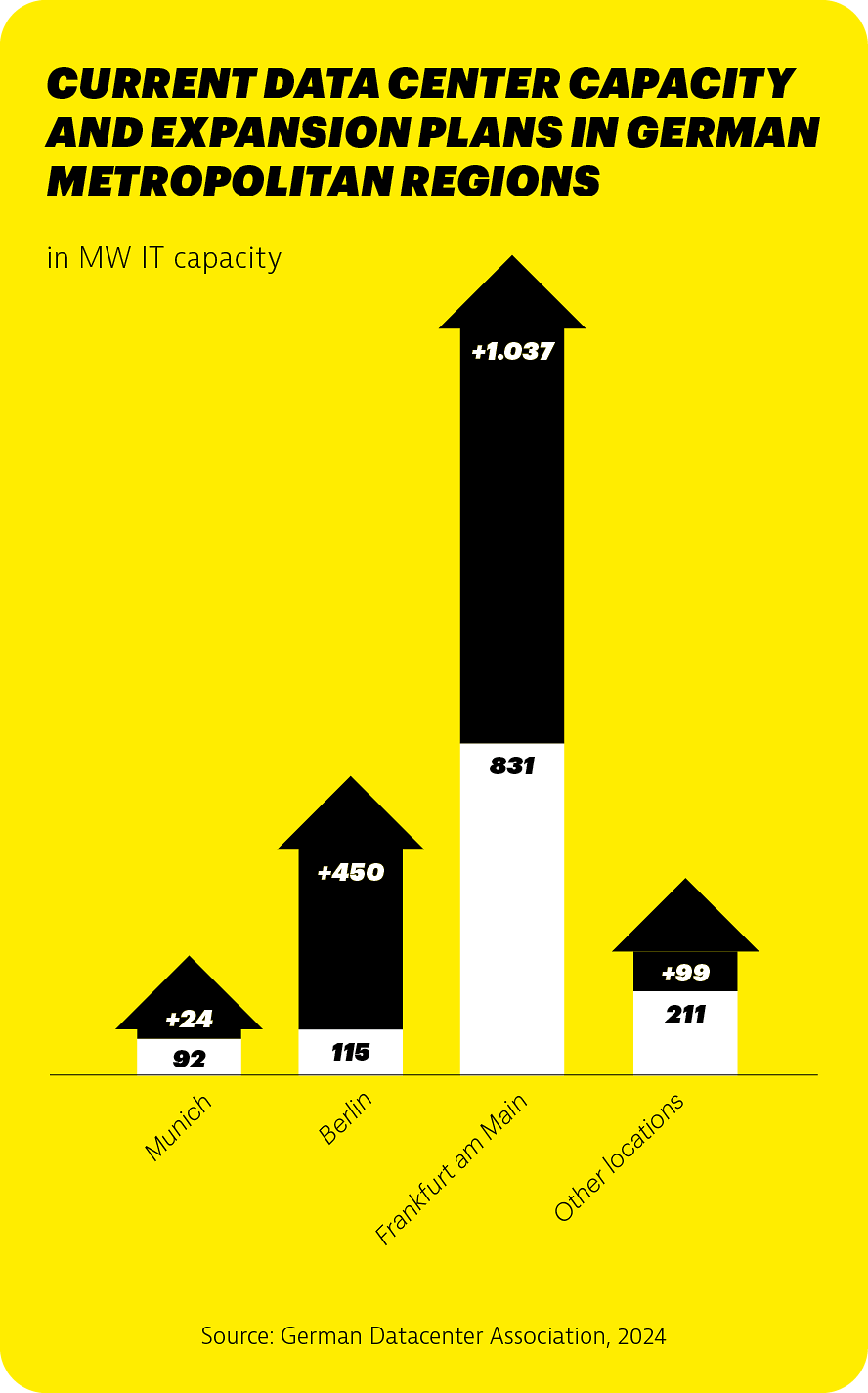Markets Germany Magazine 3/24 | Data Center
Europe's Data Central
Experts are expecting investment to pour into data centers in Germany in the coming years. Anna Klaft, chairwoman of the German Data Center Association, explains why Germany is such an attractive location and what investors need to know about the framework conditions for setting up here.
Oct 31, 2024
Ms. Klaft, your trade association predicts Germany is at the start of a steep data center investment curve. What is this based on?
Anna Klaft: We examined the German data center market for the first time in a study in 2024. It showed that data center capacities in Germany will increase from 1.3 to 3.3 gigawatts over the next five years. Based on this development, we expect companies to invest more than EUR 24 billion in the construction and expansion of data centers in Germany during this period. Current examples of this trend are the latest investments by Microsoft totaling EUR 3.2 billion and Amazon Web Services, which is putting EUR 7.8 billion into Brandenburg and a further EUR 8.8 billion into the Frankfurt am Main region.
The Interviewee
Anna Klaft is chairwoman of the German Data Center Association (GDA) and VP of Rittal. The association represents the interests of operators and service providers from the IT sector and technical infrastructure in Germany.
Which part of the world are the investments coming from?
AK: When we talk about cloud applications, we are mainly talking about large tech companies from the US. However, investment is also coming from many other countries, including the UK and the Netherlands.
What makes Germany an attractive location for data center operators at the moment?
AK: There are several reasons. With the General Data Protection Regulation (GDPR), the European Union has special data sovereignty. Data center customers want their data to be stored securely, and providers within the EU can offer this due to the legal provisions. What makes Germany unique is that we have the world’s largest internet exchange point in Frankfurt am Main, DE-CIX, which is geographically central and serves the whole of Europe. We are in a politically stable position in Germany—especially in comparison to eastern Europe. We also have a comparatively stable weather situation in Germany, with no forest fires or flooding in urban centers. This makes the construction and operation of data hubs safe and predictable.

Until a few years ago, Ireland was one of the most successful locations for data in Europe. What changed?
AK: Ireland basically ran out of electricity, causing political decision-makers to suspend the construction of new data centers. In 2022, for example, the construction of two Microsoft data centers and a Google construction project were halted. This won’t happen in Germany.
Which German cities are particularly popular with companies that are currently investing in data?
AK: Due to its central location and its major internet hub, Frankfurt am Main and the surrounding area is a focal point. Berlin and the surrounding area are also popular because space is available there.
Which other locations will be important in the coming years?
AK: The Rhineland will be an interesting location in the future. Microsoft is investing EUR 3.2 billion there—the largest investment in Germany in the company’s history. What is exciting for the industry is that politics and business are working closely together in the Rhineland to develop the location as an AI stronghold. This is creating demand for data centers.

How can investors be sure they will receive local support for their project at their chosen location in Germany?
AK: I advise foreign companies to hire employees who speak German. Often this is an underestimated factor when it comes to communicating with local decision-makers and future neighbors. It is also important to talk not only about the positive aspects of the project, but also about possible disadvantages—and how they can be solved or avoided. Open communication is key. This is how companies avoid causing resentment among neighbors and the general public.
“Many cities are looking to use waste heat for heating networks"
What positive examples do you know of?
AK: The small town of Hattersheim near Frankfurt am Main is a great example of how a data center can be integrated into a town. The mayor brought future operators and the population together from the outset and ensured that the data centers were integrated into the town’s heating concept. The waste heat from the data centers is fed into the local district heating network.
In 2023 new legislation was passed in Germany regarding the use of waste heat. What has changed?
AK: Data centers require a lot of electricity and also generate a lot of waste heat, which can be used in various ways. New centers in Germany will be obliged to use waste heat under the new law. New facilities opening from July 2026 onwards must use 10 percent of their waste heat. Data centers that go online a year later will have to use 15 percent of their waste heat and 20 percent will be mandatory for data centers from 2028 onwards.
How can data operators in Germany market their waste heat?
AK: Many German cities want to reduce the carbon emissions generated by the production of heat for district heating networks. Waste heat from data centers is considered a green source of heat because it is usually produced using electricity from renewable energy sources. Many cities are now looking to use waste heat for their heat networks.
How difficult is it in Germany to find good employees for operating data centers?
AK: In Germany, it’s comparatively easy for companies to find people with different qualifications—from specialists for planning and operations to engineers, other technical professions and well-trained business development people. This is another reason why Germany is ideally equipped for the coming years.

